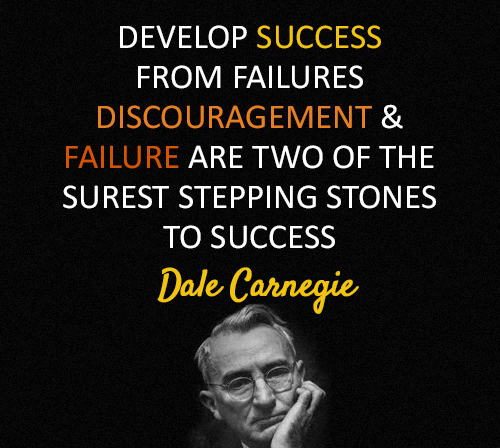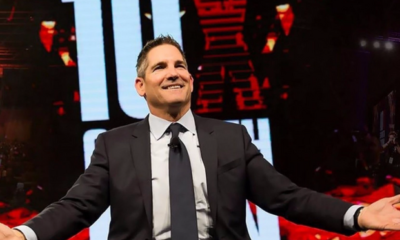Success Advice
6 Lessons of Success We Can All Learn from Dale Carnegie

Dale Carnegie was a successful and famous writer and lecturer on self-development who also developed popular courses to improve public speaking, interpersonal skills and salesmanship. He is the author of many well-received books including “How to Win Friends and Influence People”, “How to Stop Worrying and Start Living” and “Lincoln the Unknown”.
Dale Carnegie rose from a humble farm background in Missouri to become successful and renowned all over the world. He advised that you can change other people’s attitude and behavior towards you by reacting positively towards them. In this article, we look at six valuable lessons we can glean from Dale Carnegie’s life and body of work.
Dale Carnegie’s Keys To Success
1. Take a Chance
Do not settle for mediocrity or set your sights too low. You might be selling yourself short by opting to be too safe. To soar above the masses and an average life you should look and aim farther and back up your ambition with sincere hard work.
Treat life as a game and do not take it too seriously. Push the envelope to progress as much as possible with your God-given talents.
2. Be Enthusiastic
Dull people do not have the enthusiasm or energy to excel in their endeavors. You should have the enthusiasm to get up cheerfully in the morning and maintain the feel-good spirit all day long. To do this, you can adopt a “Do what you love, love what you do” attitude. This will help you give your best to all tasks and your daily job. If you are feeling low, just act enthusiastic and you will find the trait so infectious that you will actually become enthusiastic pretty soon.
3. Love Your Work
You should learn to love your work which is the basic prerequisite to do a good job every day and excel in your career. If you love your daily job, work will become play and you will love every minute of the day. Plus, you will not feel like taking a holiday as you are thoroughly enjoying yourself doing your daily tasks.
So take up a profession that you like and try to make a career in it. You will feel that getting paid at the end of the month is an additional bonus to the daily joy you get from doing your job.
4. Learn from Your Mistakes
We are mortals and hence bound to make mistakes. The trick is not to get disheartened by them but to learn useful lessons that can ensure you do not repeat them. Failure can be a stepping stone to success if we are open-minded about it and learn our lessons. Do not get stressed by mistakes and failure. Use them as an opportunity to analyze, learn and improve.
Nobody becomes a champion overnight and it is the brave man who can withstand the blows of fate and respond positively who emerges the winner in the long run.
5. Do Not Fear “Fear”
Many people are simply too scared to succeed in life. Don’t be one among them, but imagine the worst case scenario and then make plans to accept and improve it if it actually occurs that is.
Face your fears head on with the heart of a lion, soak in the pressure and continue to do a great job every day. You will begin to understand that fear is just a trick of the mind so learn to ignore it with time.
“Take a chance! All life is a chance. The man who goes furthest is generally the one who is willing to do and dare.” – Dale Carnegie
6. Learn to Prioritize
Effective time management is one of the keys to success. Try to complete the important and hard tasks first at the beginning of the day when you are fresh and raring to go. The easier and less important ones can be completed at leisure later on. Use your common sense and intelligence to differentiate between the profitable and mundane tasks and prepare an appropriate time-table to complete them all within the scheduled time.
Dale Carnegie teaches us that we should never compromise with excellence in all our endeavours. Make excellence a habit in every task you do. Focus on quality and give your best to your allotted job. And if things look bleak, do not become weary or discouraged, but soldier on bravely without giving up. Like the Nike slogan advises “Just do it” without ado and get the work done in time with quality effort.
We hope the above lessons of success learnt from Dale Carnegie motivates you to make the best of what you have and do the best you can every day to improve your career and quality of life.

Business
Why Smart Entrepreneurs Are Quietly Buying Gold and Silver
When stocks, property, and cash move together, smart business owners turn to one asset that plays by different rules.

You’ve built your business from the ground up. You know what it takes to create value, manage risk, and grow wealth. But here’s something that might surprise you: some of the most successful entrepreneurs are quietly adding physical gold and silver to their portfolios. (more…)
Business
The Simple Security Stack Every Online Business Needs
Most small businesses are exposed online without realising it. This simple protection stack keeps costs low and risks lower.

Running a business online brings speed and reach, but it also brings risk. Data moves fast. Payments travel across borders. Teams log in from homes, cafés, and airports. (more…)
Business
If Your Business Internet Keeps Letting You Down, Read This
From smoother operations to better security, dedicated internet access is quietly powering today’s high-performing businesses.

Today, a dependable internet service is the bedrock for uninterrupted business operations. Many organizations rely on stable online connections for communication, data transfer, and customer interaction. (more…)
Did You Know
How Skilled Migrants Are Building Successful Careers After Moving Countries
Behind every successful skilled migrant career is a mix of resilience, strategy, and navigating systems built for locals.

Moving to a new country for work is exciting, but it can also be unnerving. Skilled migrants leave behind familiar systems, networks, and support to pursue better job opportunities and a better future for their families. (more…)
-

 News3 weeks ago
News3 weeks agoBrandon Willington Builds 7-Figure Business by Ignoring Almost Everything
-

 Health & Fitness3 weeks ago
Health & Fitness3 weeks agoWhat Minimalism Actually Means for Your Wellness Choices
-

 Did You Know3 weeks ago
Did You Know3 weeks agoWhy Most Online Courses Fail and How to Fix Them
-

 Business3 weeks ago
Business3 weeks agoIf Your Business Internet Keeps Letting You Down, Read This
-

 Business2 weeks ago
Business2 weeks agoEntrepreneur’s Guide to Pay Stubs: Why Freelancers and Small Business Owners Need a Smart Generator
-

 Business1 week ago
Business1 week agoThe Salary Shift Giving UK Employers An Unexpected Edge
-

 Business1 week ago
Business1 week agoThe Simple Security Stack Every Online Business Needs
-

 Scale Your Business1 week ago
Scale Your Business1 week ago5 Real Ways to Grow Your User Base Fast






























5 Comments